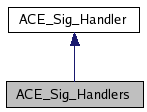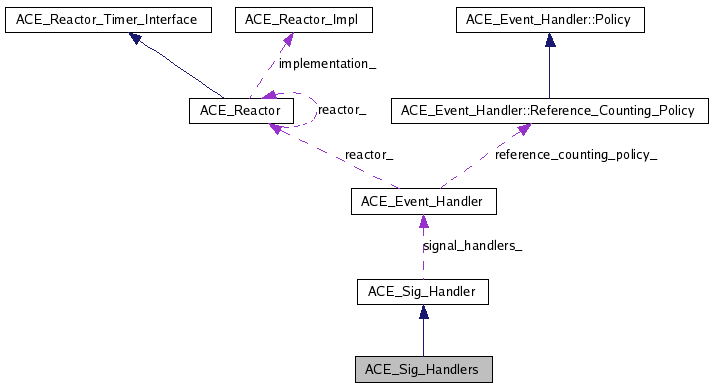ACE_Sig_Handlers Class Reference
This is an alternative signal handling dispatcher for ACE. It allows a list of signal handlers to be registered for each signal. It also makes SA_RESTART the default mode. More...
#include <Sig_Handler.h>


Public Member Functions | |
| virtual int | register_handler (int signum, ACE_Event_Handler *new_sh, ACE_Sig_Action *new_disp=0, ACE_Event_Handler **old_sh=0, ACE_Sig_Action *old_disp=0) |
| virtual int | remove_handler (int signum, ACE_Sig_Action *new_disp=0, ACE_Sig_Action *old_disp=0, int sigkey=-1) |
| virtual ACE_Event_Handler * | handler (int signum) |
| virtual ACE_Event_Handler * | handler (int signum, ACE_Event_Handler *) |
| void | dump (void) const |
| Dump the state of an object. | |
Static Public Member Functions | |
| static void | dispatch (int signum, siginfo_t *, ucontext_t *) |
Public Attributes | |
| ACE_ALLOC_HOOK_DECLARE | |
| Declare the dynamic allocation hooks. | |
Static Private Attributes | |
| static int | sigkey_ = 0 |
| static int | third_party_sig_handler_ = 0 |
Detailed Description
This is an alternative signal handling dispatcher for ACE. It allows a list of signal handlers to be registered for each signal. It also makes SA_RESTART the default mode.Using this class a program can register one or more ACE_Event_Handler with the ACE_Sig_Handler in order to handle a designated signum. When a signal occurs that corresponds to this signum, the <handle_signal> methods of all the registered ACE_Event_Handlers are invoked automatically.
Member Function Documentation
| int ACE_Sig_Handlers::register_handler | ( | int | signum, | |
| ACE_Event_Handler * | new_sh, | |||
| ACE_Sig_Action * | new_disp = 0, |
|||
| ACE_Event_Handler ** | old_sh = 0, |
|||
| ACE_Sig_Action * | old_disp = 0 | |||
| ) | [virtual] |
Add a new ACE_Event_Handler and a new sigaction associated with signum. Passes back the existing ACE_Event_Handler and its sigaction if pointers are non-zero. Returns -1 on failure and a <sigkey> that is >= 0 on success.
Reimplemented from ACE_Sig_Handler.
| int ACE_Sig_Handlers::remove_handler | ( | int | signum, | |
| ACE_Sig_Action * | new_disp = 0, |
|||
| ACE_Sig_Action * | old_disp = 0, |
|||
| int | sigkey = -1 | |||
| ) | [virtual] |
Remove an ACE_Event_Handler currently associated with signum. We remove the handler if (1) its sigkey> matches the sigkey passed as a parameter or (2) if we've been told to remove all the handlers, i.e., <sigkey> == -1. If a new disposition is given it is installed and the previous disposition is returned (if desired by the caller). Returns 0 on success and -1 if signum is invalid.
Reimplemented from ACE_Sig_Handler.
| ACE_Event_Handler * ACE_Sig_Handlers::handler | ( | int | signum | ) | [virtual] |
Return the head of the list of <ACE_Sig_Handler>s associated with SIGNUM.
Reimplemented from ACE_Sig_Handler.
| ACE_Event_Handler * ACE_Sig_Handlers::handler | ( | int | signum, | |
| ACE_Event_Handler * | new_sh | |||
| ) | [virtual] |
Set a new ACE_Event_Handler that is associated with SIGNUM at the head of the list of signals. Return the existing handler that was at the head.
Reimplemented from ACE_Sig_Handler.
| void ACE_Sig_Handlers::dispatch | ( | int | signum, | |
| siginfo_t * | siginfo, | |||
| ucontext_t * | ucontext | |||
| ) | [static] |
Callback routine registered with sigaction(2) that dispatches the <handle_signal> method of all the pre-registered ACE_Event_Handlers for signum
Reimplemented from ACE_Sig_Handler.
| void ACE_Sig_Handlers::dump | ( | void | ) | const |
Member Data Documentation
int ACE_Sig_Handlers::sigkey_ = 0 [static, private] |
Keeps track of the id that uniquely identifies each registered signal handler. This id can be used to cancel a timer via the <remove_handler> method.
int ACE_Sig_Handlers::third_party_sig_handler_ = 0 [static, private] |
If this is > 0 then a 3rd party library has registered a handler...
The documentation for this class was generated from the following files:
 1.5.5
1.5.5